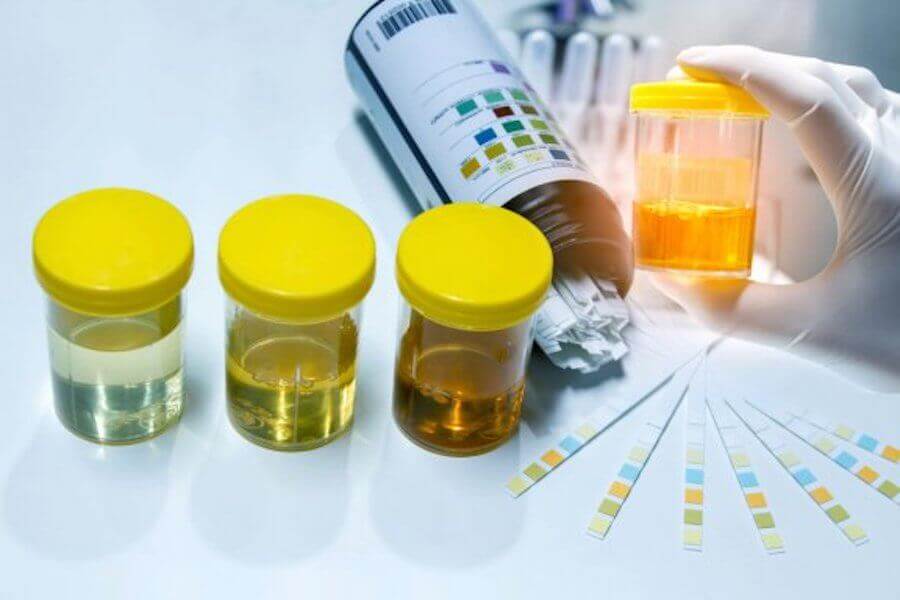The Importance of Urine Tests During Pregnancy

Urine tests during pregnancy allow for the detection of issues that can put the health of both mother and baby at risk. It’s a simple way to obtain the peace of mind you need to enjoy a happy pregnancy and be sure everything is progressing well.
Urine tests during pregnancy: An essential analysis
Urine testing is one of the the essential analyses that must take place during pregnancy. A pregnant woman’s urine supplies important information about possible issues that can affect the normal development of the fetus. Urine tests are also one of the ways to detect pregnancy in the first place. So, as you can see, they’re a vital control from the very beginning of pregnancy.
Urinary infections, kidney problems and diabetes are easily detectable through urine testing. Testing allows for the measurement of protein, sugar and bacteria levels. They also measure minerals, hormones and other substances that may indicate that something is off.

Routine urine tests during pregnancy
Urine tests during pregnancy can take place at any time of day. However, it’s always best to do them first thing in the morning. They’re a part of routine testing involving the collection of urine in a sterile container.
One test per trimester
Each trimester, it’s necessary for pregnant women to undergo urine testing. During the first trimester, lab technicians take samples from cultures. The purpose is to detect germs that can affect the urinary tract and reach the uterus through the vagina.
Then, during the second trimester, the detection of proteins allows doctors to deal with any increase in arterial pressure affecting the kidneys. This control is very important during pregnancy.
Proper hygiene prior to collecting a urine sample is essential in avoiding confusions. Clean your genital organs with a towel beforehand to avoid contaminating the sample. Also, throw out the first bit of urine that comes out. That way, you eliminate bacteria and secretions that can alter the results.
An analysis to detect gestational diabetes
This analysis involves chemically treated test strips. It allows for the detection of the presence of glucose in urine, which is an indication that a mother is suffering from gestational diabetes.
This is an illness that attacks individuals who are overweight or consume excessive sweets, but also those who are pregnant. If a woman has a family history of diabetes or has had issues during a previous pregnancy, then she’s at higher risk. Treatment must take place during the entire pregnancy. Doctors may order further testing if they consider it necessary.
Proteins and pre-eclampsia
Urine tests during pregnancy also allow for the detection of the presence of protein, especially albumine. This is evidence of a kidney problem, infection or even high blood pressure. Pre-eclampsia, a very delicate complication during pregnancy, is related to the presence of protein in urine. Its manifestations usually appear in the third trimester of pregnancy or just before birth.
Pre-eclampsia is an increase in arterial pressure that is controllable in the case of early detection. The consequences for both mother and baby can be very serious.
Premature birth is one of them, but preeclampsia can in fact be fatal for both mother and baby. Therefore, strict and regular urine testing during pregnancy is absolutely fundamental.
Ketones and bacteria in urine
Ketones in urine are an indication that the body is burning fat and using it as a source of energy due to a lack of carbohydrates. A moderate or high presence of ketones can also be an indication of gestational diabetes.
Urine testing during pregnancy also reveals the presence of bacteria that cause urine infections. These infections often compromise a woman’s kidneys with delicate consequences. Furthermore, a mistreated urine infection can cause babies to be underweight and lead to premature birth.

In the case of an anomaly, doctors will apply necessary treatment to help mother and baby enjoy a happy and healthy full-term pregnancy. Doctors have all of the information they need to correctly treat any inconveniences that may arise.
In conclusion, urine tests during pregnancy are routine, but strictly necessary. Pregnant women should undergo any tests their doctor orders and follow their doctor’s recommendations in order to keep any problems under control.
Urine tests during pregnancy allow for the detection of issues that can put the health of both mother and baby at risk. It’s a simple way to obtain the peace of mind you need to enjoy a happy pregnancy and be sure everything is progressing well.
Urine tests during pregnancy: An essential analysis
Urine testing is one of the the essential analyses that must take place during pregnancy. A pregnant woman’s urine supplies important information about possible issues that can affect the normal development of the fetus. Urine tests are also one of the ways to detect pregnancy in the first place. So, as you can see, they’re a vital control from the very beginning of pregnancy.
Urinary infections, kidney problems and diabetes are easily detectable through urine testing. Testing allows for the measurement of protein, sugar and bacteria levels. They also measure minerals, hormones and other substances that may indicate that something is off.

Routine urine tests during pregnancy
Urine tests during pregnancy can take place at any time of day. However, it’s always best to do them first thing in the morning. They’re a part of routine testing involving the collection of urine in a sterile container.
One test per trimester
Each trimester, it’s necessary for pregnant women to undergo urine testing. During the first trimester, lab technicians take samples from cultures. The purpose is to detect germs that can affect the urinary tract and reach the uterus through the vagina.
Then, during the second trimester, the detection of proteins allows doctors to deal with any increase in arterial pressure affecting the kidneys. This control is very important during pregnancy.
Proper hygiene prior to collecting a urine sample is essential in avoiding confusions. Clean your genital organs with a towel beforehand to avoid contaminating the sample. Also, throw out the first bit of urine that comes out. That way, you eliminate bacteria and secretions that can alter the results.
An analysis to detect gestational diabetes
This analysis involves chemically treated test strips. It allows for the detection of the presence of glucose in urine, which is an indication that a mother is suffering from gestational diabetes.
This is an illness that attacks individuals who are overweight or consume excessive sweets, but also those who are pregnant. If a woman has a family history of diabetes or has had issues during a previous pregnancy, then she’s at higher risk. Treatment must take place during the entire pregnancy. Doctors may order further testing if they consider it necessary.
Proteins and pre-eclampsia
Urine tests during pregnancy also allow for the detection of the presence of protein, especially albumine. This is evidence of a kidney problem, infection or even high blood pressure. Pre-eclampsia, a very delicate complication during pregnancy, is related to the presence of protein in urine. Its manifestations usually appear in the third trimester of pregnancy or just before birth.
Pre-eclampsia is an increase in arterial pressure that is controllable in the case of early detection. The consequences for both mother and baby can be very serious.
Premature birth is one of them, but preeclampsia can in fact be fatal for both mother and baby. Therefore, strict and regular urine testing during pregnancy is absolutely fundamental.
Ketones and bacteria in urine
Ketones in urine are an indication that the body is burning fat and using it as a source of energy due to a lack of carbohydrates. A moderate or high presence of ketones can also be an indication of gestational diabetes.
Urine testing during pregnancy also reveals the presence of bacteria that cause urine infections. These infections often compromise a woman’s kidneys with delicate consequences. Furthermore, a mistreated urine infection can cause babies to be underweight and lead to premature birth.

In the case of an anomaly, doctors will apply necessary treatment to help mother and baby enjoy a happy and healthy full-term pregnancy. Doctors have all of the information they need to correctly treat any inconveniences that may arise.
In conclusion, urine tests during pregnancy are routine, but strictly necessary. Pregnant women should undergo any tests their doctor orders and follow their doctor’s recommendations in order to keep any problems under control.
All cited sources were thoroughly reviewed by our team to ensure their quality, reliability, currency, and validity. The bibliography of this article was considered reliable and of academic or scientific accuracy.
- Cruz Blanca. 2016. Exámenes durante el embarazo. https://www.cruzblanca.cl/cruzblanca/site/artic/20161229/asocfile/20161229083142/informaci__n_sobre_examenes_durante_el_embarazo_2.pdf
- Dr. Rubén Melgar. 2016. Infección de vías urinarias en el embarazo. https://www.salud.gob.sv/archivos/pdf/telesalud_2016_presentaciones/presentacion07102016/IVU-Y-EMBARAZO.pdf
This text is provided for informational purposes only and does not replace consultation with a professional. If in doubt, consult your specialist.








